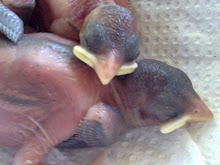 It's a great day for my little sparrow. I've been thinking of a good name for him, and since he always responds when I say, "Ip-ip-ip-ip!" I'm naming him Ipip.
It's a great day for my little sparrow. I've been thinking of a good name for him, and since he always responds when I say, "Ip-ip-ip-ip!" I'm naming him Ipip. His new name has drawn a few amused laughs including my own. But i love how it's juvenile and unique; I like it that his name is laid back.
Ipip has learned to perch, as he stands on one finger instead of the palm of my hand. He can also stand on chopsticks, but I still get scared because his grip is not yet as strong as that of an adult sparrow. Nevertheless, I allow him to practice his perch and strengthen his muscles - but I always have my hand a few inches below him, just in case.
His chirp has changed. At first I thought he had a cough or inhalation pneumonia, but it seems that his voice is changing as he is growing. I've heard a few sparrows out in our garden having the same chirp. His chirp used to be more of a tweet: high pitched, no vibrato. Now, it's less high pitched, with a little trill that makes it sound like a "chirrip".
He is now completely feathered. In just 10 days, he has gone from being bald to having full feathers.
he has gone from being bald to having full feathers.
 he has gone from being bald to having full feathers.
he has gone from being bald to having full feathers.He also has quite a unique personality. He doesn't like it when your finger approaches his face as he pecks at them in anxiety, but he doesn't mind noses even when they stroke his beak.
He is actually learning to drink little drops of water from his spoon. Instead of putting a drp of water on one side of the outside of his beak, I now let him sip as a drop of water hangs tentatively from the spoon. I've been observing that he never inhales the water; I think he's ready to actually drink water from hanging drops on his spoon.
I still feed him a handfeeding mix I found on the internet. He is now more actively pecking from the spoon, extending his neck to peck instead of waiting for the spoon to come in complete contact with his mouth.
I will be putting twigs in his nest now. He will need to exercise his grip, so that he can build up his muscle strength.

I still can't believe I have a 10 day old house sparrow! I'm sure he's a few days older because I didn't exactly see him just hatch from his shell, but it's probably by just one or two days, given his completely bald appearance when I first adopted him.
He no longer tweets and cries nonstop. He's now a very quiet and observant bird, chirping and flapping his wings only when he needs to eat, or when he simply needs a little attention. ^_^













